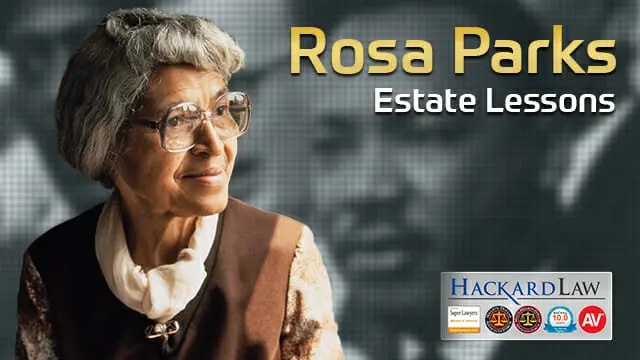
Rosa Parks | Estate Lessons
Rosa Parks will be forever known as the woman who literally sat down for justice and changed America for the better. Her act of civil disobedience in 1955 on a public bus in Alabama was a key turning point in the Civil Rights Movement, which culminated in a ruling by the U. S. Supreme Court in which segregation on public buses became unconstitutional.
By the time she died in 2005 at the age of 92, Parks suffered for many years with a progressive case of Alzheimer’s Disease. As I wrote about in my book, Alzheimer’s, Widowed Stepmothers and Estate Crimes, cognitive decline is often used by relatives to challenge the validity of wills and trusts, which is exactly what happened in Parks’ case.
The “Mother of the Freedom Movement” had a very modest estate valued at a reported $372,000. However, at the time she wrote her will in her mid 80’s she also created a non-profit organization called the Rosa and Raymond Parks Institute for Self Development to which she donated important and valuable civil rights documents and artifacts. The value of those items was, of course, incalculable but certainly well into the millions.
And so, Parks’ nieces and nephews challenged her will and trust on the basis that she was mentally incompetent when she wrote the documents and was also unduly influenced by a close friend who, it turned out, received 90% of the estate’s royalties while her relatives were to receive 10%.
A resulting lawsuit in probate court was settled just before it went to trial, but new and related court battles immediately cropped up. The opposing parties moved on to argue about attorney’s fees, a dispute that went all the way to the Michigan Court of Appeals. Then, an attorney who represented Parks’ friend and the non-profit institute allegedly and inadvertently disclosed confidential settlement information in open court and in front of a newspaper reporter. The transgression so enraged the probate judge that he ordered the lawyer’s client to forfeit all rights to Rosa Parks’ royalties and properties. Of course, as happens in litigation, that ruling led to another court case which, several years later, went to the Michigan Supreme Court.
In the end, the Michigan Supreme Court ruled that no breach of confidentiality occurred and that Rosa Parks’ wishes, as she laid them out in her will and trust, were to be followed. By this time, the legal battles were already 7 years in the making.
The last we heard, there may still be lawsuits pending between Rosa Parks’ relatives and her non-profit institute.
The lessons from this case are several. First, Rosa Parks’ probably waited too long before crafting her will and trust. It’s almost a given that relatives will challenge any will or trust created when someone is in their mid-80’s, especially when large sums of money are on the line.
Second, Parks’ relatives were almost certain to be unhappy that a friend would get 90% of the estate while they would get 10%. If Parks was indeed in full control of her mental capacity at that time, even in her mid 80’s, she might have taken medical and legal steps to head off challenges to her will.
Of course, this is 20-20 hindsight, but perhaps it is still a valuable lesson for today’s older Baby Boomers who may now be facing similar circumstances. If you decide to start changing your estate and trust documents in your mid-70’s, consider doing so only with combined expert medical and legal advice.
Before you go, please let me know if you’d like to receive a free copy of my first book, The Wolf at the Door, or my second book, Alzheimer’s, Widowed Stepmothers & Estate Crimes. Just send your address in an email to me at ha*****@********aw.com, and I’ll be glad to put one in the mail.

 (916) 775-8542
(916) 775-8542